Accommodation · Africa · Argentina · Asia · Bolivia · Botswana · Cambodia · Central America · Costa Rica · Featured · Fiji · Hotels · Mexico · North America · Oceania · Regions · Resorts · Rwanda · South America · Sri Lanka
2021’s best eco-luxury hotels
Sustainable travel will ensure the destinations we cherish will be around for future generations. Sustainable luxury tourism applies to using local guides, using energy-efficient transport, dining at restaurants that source organic and local produce, and of course eco-luxury accommodation.
Amid a pandemic and ongoing environmental issues such as global warming, travel is increasingly important, and more than just a vacation. It is important to choose your destination carefully and check that your accommodation and travel advisor is committed to sustainability.
Unfortunately, terms such as “sustainability” have been overused and ‘greenwashed’, resulting in destinations that may look the part, but aren’t actually as responsible as they appear. From groundbreaking initiatives (with meaningful results), or official recognition, the lodges below have the credentials to demonstrate that they are being run in ways that conserve the environment.
Hotels can indeed be eco-friendly without compromising the superb levels of service and comfort that you are accustomed to. Here are my Top 10 new eco-luxury hotels for 2021, along with ways you can make a difference whilst staying in each country:
10. Kachi Lodge, Bolivia
After extensive consultations with the community of Jirira in 2015 resulted in kindness and cooperation, when this was blended with the beauty of the place, the location, in the sublime Salar de Uyuni in southern Bolivia was meant to be. The camp was developed with the community from the beginning, and they quickly became a critical part of the operations. Today, community members hold positions essential to the functioning of Kachi Lodge.
 In addition to the special relationship with the community, the conservation of the environment has been at the heart of the camp’s concerns from the outset. The founders invested in cutting-edge technologies in both water and energy management systems.
For the construction and operation of Kachi Lodge, Bolivian companies were preferred and as much as possible was sourced locally. The wood used is a Bolivian wood with FSC certification.
Although Kachi Lodge is a permanent structure, it remains mobile. The whole lodge is built on a wooden platform whose pillars are freestanding on the salt flats. No anchoring or drilling was done in the salt crust. The lodge operates on solar energy, heating the entire water supply. Wind turbines are being evaluated as an additional energy source. For water management, pumps convey the greywater back into a dirty water tank that connects to a unique, reverse osmosis closed-loop filtering system. The system already prevents any discharge of wastewater into the environment and ultimately minimizes water consumption.
Stoves are installed in each dome to facilitate optimal heating; the pellets used to run them are made from leftover wood. Incineration toilets operate in each room, which instantly burn all organic matter, leaving only a small ash residue even after a few days of use, meaning there is no black water to discharge or treat.
Kachi Lodge strives for a 0% plastic policy, with no plastic bottles or packaging.
As you would expect, Bolivia’s cultural heritage is celebrated, for example through collaboration with Nativa restaurant, which almost exclusively sources Bolivian produce, or by exhibiting the art of Gaston Ugalde, Bolivia’s most famous contemporary Bolivian artist. This cultural heritage is also highlighted through activities offered by Kachi Lodge in collaboration with the local community.
Local guides are trained with the help of experienced tourism professionals.
How to make a difference in Bolivia
You can help build a home for a family near La Paz, helping alongside the homeowners. Tasks include: clearing the land, digging foundations, laying bricks, mixing mortar, installing doors and windows, painting the house, and other physical activities.
9. Shinta Mani Wild, Cambodia
This 15-tent encampment is located on the southern border of Cambodia’s little-known Cardamom National Park. Although each tent represents a unique theme reflecting different aesthetics, the consistent theme is nature and its conservation.
In addition to the special relationship with the community, the conservation of the environment has been at the heart of the camp’s concerns from the outset. The founders invested in cutting-edge technologies in both water and energy management systems.
For the construction and operation of Kachi Lodge, Bolivian companies were preferred and as much as possible was sourced locally. The wood used is a Bolivian wood with FSC certification.
Although Kachi Lodge is a permanent structure, it remains mobile. The whole lodge is built on a wooden platform whose pillars are freestanding on the salt flats. No anchoring or drilling was done in the salt crust. The lodge operates on solar energy, heating the entire water supply. Wind turbines are being evaluated as an additional energy source. For water management, pumps convey the greywater back into a dirty water tank that connects to a unique, reverse osmosis closed-loop filtering system. The system already prevents any discharge of wastewater into the environment and ultimately minimizes water consumption.
Stoves are installed in each dome to facilitate optimal heating; the pellets used to run them are made from leftover wood. Incineration toilets operate in each room, which instantly burn all organic matter, leaving only a small ash residue even after a few days of use, meaning there is no black water to discharge or treat.
Kachi Lodge strives for a 0% plastic policy, with no plastic bottles or packaging.
As you would expect, Bolivia’s cultural heritage is celebrated, for example through collaboration with Nativa restaurant, which almost exclusively sources Bolivian produce, or by exhibiting the art of Gaston Ugalde, Bolivia’s most famous contemporary Bolivian artist. This cultural heritage is also highlighted through activities offered by Kachi Lodge in collaboration with the local community.
Local guides are trained with the help of experienced tourism professionals.
How to make a difference in Bolivia
You can help build a home for a family near La Paz, helping alongside the homeowners. Tasks include: clearing the land, digging foundations, laying bricks, mixing mortar, installing doors and windows, painting the house, and other physical activities.
9. Shinta Mani Wild, Cambodia
This 15-tent encampment is located on the southern border of Cambodia’s little-known Cardamom National Park. Although each tent represents a unique theme reflecting different aesthetics, the consistent theme is nature and its conservation.
 As sustainability and conservation are priorities for Shinta Mani Wild, the camp operates in partnership with international nonprofit wildlife and forest conservation organization Wildlife Alliance. Resident naturalists support the chefs in sourcing local produce to create incredible dishes. Shinta Mani Wild bottles its own water, uses recycled containers and has no single-use plastics. Impressively, 70% of the staff are from the local village.
The property exists to protect an 800-acre private nature sanctuary, as well as the neighboring forests, from poaching and logging. They have their own ranger station with a team of armed rangers that go on daily anti-poaching patrols. The goal is to not only protect this land but make it better than when they found it. This is now the biggest and last great forest in South East Asia
Shinta Mani Wild was wholly constructed by people from the area, using local materials, and without cutting down any trees. They have implemented a plastic-free supply chain, the first in Asia. Amenities are provided on request only. Thanks to solar panels, the camp is almost completely off the grid.
How to make a difference in Cambodia
You can head to Siem Reap and build a home for a low-income family; fantastic for family bonding and helping your kids appreciate how fortunate they are.
8. One & Only Mandarina, Mexico
On the Riviera Nayarit on Mexico’s wild Pacific coast, this superb property draws deeply on Mexico’s culture, with references to the Indigenous Cora and Huichol people. Traditional textiles and pottery are features of each room, and the spa, set in a natural volcanic-rock garden, is based on ancient healing practices and offers treatments including temazcal sweat-lodge rituals.
As sustainability and conservation are priorities for Shinta Mani Wild, the camp operates in partnership with international nonprofit wildlife and forest conservation organization Wildlife Alliance. Resident naturalists support the chefs in sourcing local produce to create incredible dishes. Shinta Mani Wild bottles its own water, uses recycled containers and has no single-use plastics. Impressively, 70% of the staff are from the local village.
The property exists to protect an 800-acre private nature sanctuary, as well as the neighboring forests, from poaching and logging. They have their own ranger station with a team of armed rangers that go on daily anti-poaching patrols. The goal is to not only protect this land but make it better than when they found it. This is now the biggest and last great forest in South East Asia
Shinta Mani Wild was wholly constructed by people from the area, using local materials, and without cutting down any trees. They have implemented a plastic-free supply chain, the first in Asia. Amenities are provided on request only. Thanks to solar panels, the camp is almost completely off the grid.
How to make a difference in Cambodia
You can head to Siem Reap and build a home for a low-income family; fantastic for family bonding and helping your kids appreciate how fortunate they are.
8. One & Only Mandarina, Mexico
On the Riviera Nayarit on Mexico’s wild Pacific coast, this superb property draws deeply on Mexico’s culture, with references to the Indigenous Cora and Huichol people. Traditional textiles and pottery are features of each room, and the spa, set in a natural volcanic-rock garden, is based on ancient healing practices and offers treatments including temazcal sweat-lodge rituals.
 The restaurants are perhaps the most complete expression of Mandarina‘s sustainable ethos. All three menus showcase the jaw-dropping bounty of the region, with a creativity and style that never outshines the ingredients themselves. Enjoy raw clams from the famed fisheries around San Blas, homemade tostadas, abalone layered with palm hearts from the Pacific coast, local red snapper, and Oaxacan ‘chintextle’, a rust-red paste of pasilla chiles and dried shrimp.
How to make a difference in Mexico
Head to Cancun on the Caribbean coast and help sort donated food and clothing, renovate schools, or provide entertainment at an elderly home.
7. Awasi Iguazu, Argentina
Awasi Iguazu is the most luxurious place to stay when visiting the famed Iguazu Falls. Dishes are seasonal and locally-sourced to minimize food miles, and also prepared on site – yogurts, juices and granolas served at breakfast are prepared fresh each morning.
The restaurants are perhaps the most complete expression of Mandarina‘s sustainable ethos. All three menus showcase the jaw-dropping bounty of the region, with a creativity and style that never outshines the ingredients themselves. Enjoy raw clams from the famed fisheries around San Blas, homemade tostadas, abalone layered with palm hearts from the Pacific coast, local red snapper, and Oaxacan ‘chintextle’, a rust-red paste of pasilla chiles and dried shrimp.
How to make a difference in Mexico
Head to Cancun on the Caribbean coast and help sort donated food and clothing, renovate schools, or provide entertainment at an elderly home.
7. Awasi Iguazu, Argentina
Awasi Iguazu is the most luxurious place to stay when visiting the famed Iguazu Falls. Dishes are seasonal and locally-sourced to minimize food miles, and also prepared on site – yogurts, juices and granolas served at breakfast are prepared fresh each morning.
 The chefs all produce their own jams, vinegars, pickles, snacks, infusions and syrups, therefore minimizing wastage and optimizing the use of excess and surplus ingredients.
Vendors and suppliers are vetted and selected based on the quantity of packaging they use. The kitchen gardens use organic waste to produce compost and fertilizer to help grow more locally sourced ingredients.
How to make a difference in Argentina
You can install solar-powered hot water heaters in low-income homes near Buenos Aires. A fun family bonding activity that benefits the recipient family as well as the environment – a double win!
6. Kasiiya Lodge, Costa Rica
Dramatically situated in Papagayo on the northwest coast of Costa Rica, Kasiiya is designed to blend into nature. Positioned amidst 123 acres of wild terrain, the tropical rainforest is preserved and only natural materials were used in order to leave the landscape untouched.
The chefs all produce their own jams, vinegars, pickles, snacks, infusions and syrups, therefore minimizing wastage and optimizing the use of excess and surplus ingredients.
Vendors and suppliers are vetted and selected based on the quantity of packaging they use. The kitchen gardens use organic waste to produce compost and fertilizer to help grow more locally sourced ingredients.
How to make a difference in Argentina
You can install solar-powered hot water heaters in low-income homes near Buenos Aires. A fun family bonding activity that benefits the recipient family as well as the environment – a double win!
6. Kasiiya Lodge, Costa Rica
Dramatically situated in Papagayo on the northwest coast of Costa Rica, Kasiiya is designed to blend into nature. Positioned amidst 123 acres of wild terrain, the tropical rainforest is preserved and only natural materials were used in order to leave the landscape untouched.
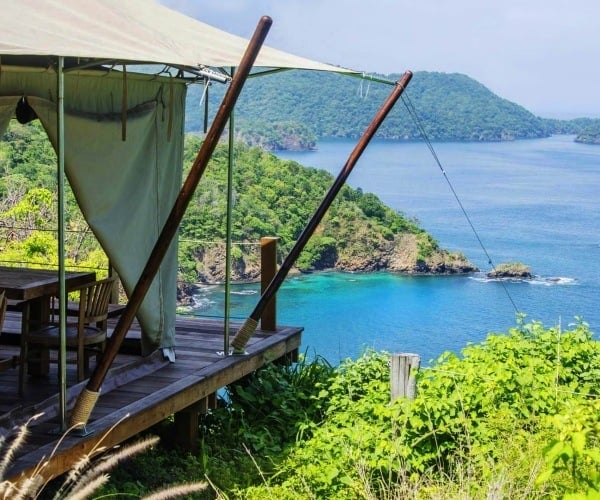 The design has a village feel, made up of a cluster of tents, built without cutting down a single tree and without the use of concrete and nails.
Local wood was employed for the tent structure and interiors. The use of earthy tones and natural colour palettes inside the tents help you continue to feel being immersed in nature.
How to make a difference in Costa Rica
You can build a daycare center in nearby Guanacaste. Your young ones can focus on interaction and playing with the local children, while your older ones become inspired to be world changers.
5. Six Senses Fiji
On Malolo Island, just 16 miles from Nadi, this is Fiji’s finest eco-luxury accommodation.
The design has a village feel, made up of a cluster of tents, built without cutting down a single tree and without the use of concrete and nails.
Local wood was employed for the tent structure and interiors. The use of earthy tones and natural colour palettes inside the tents help you continue to feel being immersed in nature.
How to make a difference in Costa Rica
You can build a daycare center in nearby Guanacaste. Your young ones can focus on interaction and playing with the local children, while your older ones become inspired to be world changers.
5. Six Senses Fiji
On Malolo Island, just 16 miles from Nadi, this is Fiji’s finest eco-luxury accommodation.
 Sustainability programs include conserving energy and rainwater, making their own high-quality drinking water and growing their own organic produce to delight your tastebuds. The lodge has one of the largest off-grid solar installations in the Southern Hemisphere, producing 100% power for the resort and desalination plant. Tesla batteries are used to store the sun’s energy. Over 100 hens and roosters roam, relax and produce fresh eggs for use throughout the resort’s restaurants. A protected beehive area produces delicious honey and honeycomb.
The resort offers apprenticeships and development programs to promising young Fijians, and supports the local economy by working with a number of cottage industries.
Six Senses Fiji also partners with Rise Beyond the Reef. This NGO works with women in remote communities, teaching them to use their traditional skills to produce marketable goods. These products are used in the rooms and restaurants, and for sale in the boutique. The income from these goods goes into alleviating poverty in the local communities.
How to make a difference in Fiji
You can help renovate a home for abused children, or even build a home for family in need of a decent place to live.
4. Cielo Lodge, Costa Rica
The obvious thing you’ll notice from this 1,600-foot-high eco-lodge peaking out from the jungle are the breathtaking views.
Sustainability programs include conserving energy and rainwater, making their own high-quality drinking water and growing their own organic produce to delight your tastebuds. The lodge has one of the largest off-grid solar installations in the Southern Hemisphere, producing 100% power for the resort and desalination plant. Tesla batteries are used to store the sun’s energy. Over 100 hens and roosters roam, relax and produce fresh eggs for use throughout the resort’s restaurants. A protected beehive area produces delicious honey and honeycomb.
The resort offers apprenticeships and development programs to promising young Fijians, and supports the local economy by working with a number of cottage industries.
Six Senses Fiji also partners with Rise Beyond the Reef. This NGO works with women in remote communities, teaching them to use their traditional skills to produce marketable goods. These products are used in the rooms and restaurants, and for sale in the boutique. The income from these goods goes into alleviating poverty in the local communities.
How to make a difference in Fiji
You can help renovate a home for abused children, or even build a home for family in need of a decent place to live.
4. Cielo Lodge, Costa Rica
The obvious thing you’ll notice from this 1,600-foot-high eco-lodge peaking out from the jungle are the breathtaking views.
 The vista stretches over Corcovado National Park, and out to the Pacific. Though the real draw may be the mission of the lodge itself: dedicated to preserving Costa Rica’s rainforests, Cielo’s owners have already planted over 4,000 hardwood and fruit trees, enticing even more birds and mammals back to the area.
Another way to make a difference in Costa Rica
Conserve turtles in the Osa Peninsula: tag turtles and study their behavior patterns. You can also help with the mangrove reforestation projects to restore the natural coastal environment: vital to the sea turtles and indeed all wildlife.
3. Wild Coast Tented Camp, Sri Lanka
Wild Coast Tented Lodge is a beguiling 36-tent safari camp located on the edge of Yala National Park, in the south of Sri Lanka. Its architecture blends into the landscape, which comprises dryland forests, and a rugged yet sandy coastline. The camp celebrates the flora, fauna and culture of the area with minimal intrusion on the landscape.
The vista stretches over Corcovado National Park, and out to the Pacific. Though the real draw may be the mission of the lodge itself: dedicated to preserving Costa Rica’s rainforests, Cielo’s owners have already planted over 4,000 hardwood and fruit trees, enticing even more birds and mammals back to the area.
Another way to make a difference in Costa Rica
Conserve turtles in the Osa Peninsula: tag turtles and study their behavior patterns. You can also help with the mangrove reforestation projects to restore the natural coastal environment: vital to the sea turtles and indeed all wildlife.
3. Wild Coast Tented Camp, Sri Lanka
Wild Coast Tented Lodge is a beguiling 36-tent safari camp located on the edge of Yala National Park, in the south of Sri Lanka. Its architecture blends into the landscape, which comprises dryland forests, and a rugged yet sandy coastline. The camp celebrates the flora, fauna and culture of the area with minimal intrusion on the landscape.
 The existing vegetation is retained to ensure an authentic experience of the landscape. Local influences form an integral part of the project, from cultural traditions and materials, to community involvement.
Minimizing environmental impact demanded a locally-focused, sustainable approach to the whole development. Solar panels produce up to 40% of the camp’s energy needs. Food waste is processed to produce biogas for the kitchen, and grey water is recycled and used for watering the gardens. Even more, heat from the air-conditioning units is used for water heating.
Sourced locally as much as possible, natural materials were used in tune with the surrounding environment, celebrating the regional tradition of mud brick construction. Excavated stone and locally quarried quartz are used widely throughout, and residue clay from the gravel sieving process was mixed with elephant dung, an abundant resource, to create the restaurant and welcome area seating.
How to make a difference in Sri Lanka
Families can bond closer together by helping build a home for a family on Sri Lanka’s west coast, in a village still overcoming the effects of the Boxing Day tsunami.
2. Bisate Lodge, Rwanda
Nestled into the heart of a stunning natural amphitheater, the design of Bisate Lodge is unique. A series of nestlike rooms all include decks with incredible views.
The existing vegetation is retained to ensure an authentic experience of the landscape. Local influences form an integral part of the project, from cultural traditions and materials, to community involvement.
Minimizing environmental impact demanded a locally-focused, sustainable approach to the whole development. Solar panels produce up to 40% of the camp’s energy needs. Food waste is processed to produce biogas for the kitchen, and grey water is recycled and used for watering the gardens. Even more, heat from the air-conditioning units is used for water heating.
Sourced locally as much as possible, natural materials were used in tune with the surrounding environment, celebrating the regional tradition of mud brick construction. Excavated stone and locally quarried quartz are used widely throughout, and residue clay from the gravel sieving process was mixed with elephant dung, an abundant resource, to create the restaurant and welcome area seating.
How to make a difference in Sri Lanka
Families can bond closer together by helping build a home for a family on Sri Lanka’s west coast, in a village still overcoming the effects of the Boxing Day tsunami.
2. Bisate Lodge, Rwanda
Nestled into the heart of a stunning natural amphitheater, the design of Bisate Lodge is unique. A series of nestlike rooms all include decks with incredible views.
 This is one of the best places to base yourself and encounter the mountain gorillas: my hour with one gorilla family is a highlight of my life. You may also spot jackal, buffalo, golden monkeys, elephants and Egyptian mongooses, among others.
The lodge’s environmental initiatives include habitat reforestation, and aims to become a Centre of Excellence for gorilla research. You are encouraged to actively engage with these initiatives during your stay.
How to make a difference in Rwanda
Build a home for genocide survivors in need of a decent place to live. A good home provides security and is healthier, so fewer sick days and school absenteeism, resulting in higher incomes and improved education outcomes.
1. Xigera Safari Lodge, Botswana
Deep in the Okavango Delta, Xigera takes sustainable luxury to another level. Spend a night in an off-the-grid treehouse with an open-air star bed, 33 feet from the ground.
This is one of the best places to base yourself and encounter the mountain gorillas: my hour with one gorilla family is a highlight of my life. You may also spot jackal, buffalo, golden monkeys, elephants and Egyptian mongooses, among others.
The lodge’s environmental initiatives include habitat reforestation, and aims to become a Centre of Excellence for gorilla research. You are encouraged to actively engage with these initiatives during your stay.
How to make a difference in Rwanda
Build a home for genocide survivors in need of a decent place to live. A good home provides security and is healthier, so fewer sick days and school absenteeism, resulting in higher incomes and improved education outcomes.
1. Xigera Safari Lodge, Botswana
Deep in the Okavango Delta, Xigera takes sustainable luxury to another level. Spend a night in an off-the-grid treehouse with an open-air star bed, 33 feet from the ground.
 Eighty artists, artisans, crafters, and designers from across Africa were commissioned to produce a living gallery, with furniture sculpted on- site from fallen trees and tailored crockery collections by some of the continent’s most extreme ceramicists. Xigera boasts the first spa in Africa to offer organic, ‘farm-to-face’ remedies.
What’s more, it has the latest in Tesla solar-hybrid energy technology.
How to make a difference in Botswana
I suggest combining Botswana with the awesome Victoria Falls on the border of Zambia and Zimbabwe; in Zambia you can also help build a home for a widow and her children, help in the medical clinic if you are trained, or teach in the school.
Christopher Hill is Founder and CEO at Hands Up Holidays. Hands Up Holidays is an award-winning travel company specialising in tailor-made luxury family trips that combine sightseeing with hands-on service projects.
If you would like to be a guest blogger on A Luxury Travel Blog in order to raise your profile, please contact us.
Eighty artists, artisans, crafters, and designers from across Africa were commissioned to produce a living gallery, with furniture sculpted on- site from fallen trees and tailored crockery collections by some of the continent’s most extreme ceramicists. Xigera boasts the first spa in Africa to offer organic, ‘farm-to-face’ remedies.
What’s more, it has the latest in Tesla solar-hybrid energy technology.
How to make a difference in Botswana
I suggest combining Botswana with the awesome Victoria Falls on the border of Zambia and Zimbabwe; in Zambia you can also help build a home for a widow and her children, help in the medical clinic if you are trained, or teach in the school.
Christopher Hill is Founder and CEO at Hands Up Holidays. Hands Up Holidays is an award-winning travel company specialising in tailor-made luxury family trips that combine sightseeing with hands-on service projects.
If you would like to be a guest blogger on A Luxury Travel Blog in order to raise your profile, please contact us.
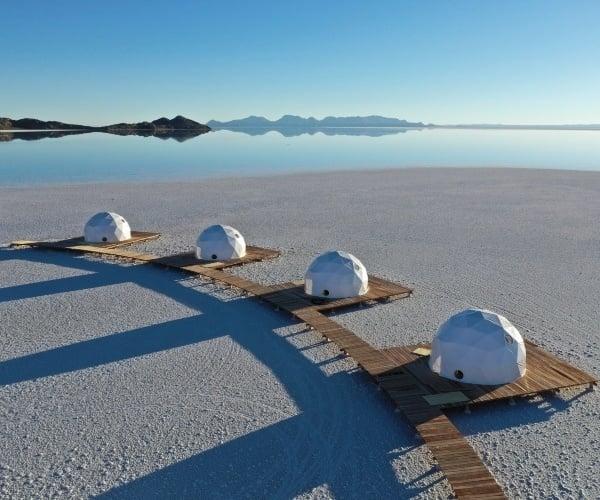 In addition to the special relationship with the community, the conservation of the environment has been at the heart of the camp’s concerns from the outset. The founders invested in cutting-edge technologies in both water and energy management systems.
For the construction and operation of Kachi Lodge, Bolivian companies were preferred and as much as possible was sourced locally. The wood used is a Bolivian wood with FSC certification.
Although Kachi Lodge is a permanent structure, it remains mobile. The whole lodge is built on a wooden platform whose pillars are freestanding on the salt flats. No anchoring or drilling was done in the salt crust. The lodge operates on solar energy, heating the entire water supply. Wind turbines are being evaluated as an additional energy source. For water management, pumps convey the greywater back into a dirty water tank that connects to a unique, reverse osmosis closed-loop filtering system. The system already prevents any discharge of wastewater into the environment and ultimately minimizes water consumption.
Stoves are installed in each dome to facilitate optimal heating; the pellets used to run them are made from leftover wood. Incineration toilets operate in each room, which instantly burn all organic matter, leaving only a small ash residue even after a few days of use, meaning there is no black water to discharge or treat.
Kachi Lodge strives for a 0% plastic policy, with no plastic bottles or packaging.
As you would expect, Bolivia’s cultural heritage is celebrated, for example through collaboration with Nativa restaurant, which almost exclusively sources Bolivian produce, or by exhibiting the art of Gaston Ugalde, Bolivia’s most famous contemporary Bolivian artist. This cultural heritage is also highlighted through activities offered by Kachi Lodge in collaboration with the local community.
Local guides are trained with the help of experienced tourism professionals.
How to make a difference in Bolivia
You can help build a home for a family near La Paz, helping alongside the homeowners. Tasks include: clearing the land, digging foundations, laying bricks, mixing mortar, installing doors and windows, painting the house, and other physical activities.
9. Shinta Mani Wild, Cambodia
This 15-tent encampment is located on the southern border of Cambodia’s little-known Cardamom National Park. Although each tent represents a unique theme reflecting different aesthetics, the consistent theme is nature and its conservation.
In addition to the special relationship with the community, the conservation of the environment has been at the heart of the camp’s concerns from the outset. The founders invested in cutting-edge technologies in both water and energy management systems.
For the construction and operation of Kachi Lodge, Bolivian companies were preferred and as much as possible was sourced locally. The wood used is a Bolivian wood with FSC certification.
Although Kachi Lodge is a permanent structure, it remains mobile. The whole lodge is built on a wooden platform whose pillars are freestanding on the salt flats. No anchoring or drilling was done in the salt crust. The lodge operates on solar energy, heating the entire water supply. Wind turbines are being evaluated as an additional energy source. For water management, pumps convey the greywater back into a dirty water tank that connects to a unique, reverse osmosis closed-loop filtering system. The system already prevents any discharge of wastewater into the environment and ultimately minimizes water consumption.
Stoves are installed in each dome to facilitate optimal heating; the pellets used to run them are made from leftover wood. Incineration toilets operate in each room, which instantly burn all organic matter, leaving only a small ash residue even after a few days of use, meaning there is no black water to discharge or treat.
Kachi Lodge strives for a 0% plastic policy, with no plastic bottles or packaging.
As you would expect, Bolivia’s cultural heritage is celebrated, for example through collaboration with Nativa restaurant, which almost exclusively sources Bolivian produce, or by exhibiting the art of Gaston Ugalde, Bolivia’s most famous contemporary Bolivian artist. This cultural heritage is also highlighted through activities offered by Kachi Lodge in collaboration with the local community.
Local guides are trained with the help of experienced tourism professionals.
How to make a difference in Bolivia
You can help build a home for a family near La Paz, helping alongside the homeowners. Tasks include: clearing the land, digging foundations, laying bricks, mixing mortar, installing doors and windows, painting the house, and other physical activities.
9. Shinta Mani Wild, Cambodia
This 15-tent encampment is located on the southern border of Cambodia’s little-known Cardamom National Park. Although each tent represents a unique theme reflecting different aesthetics, the consistent theme is nature and its conservation.
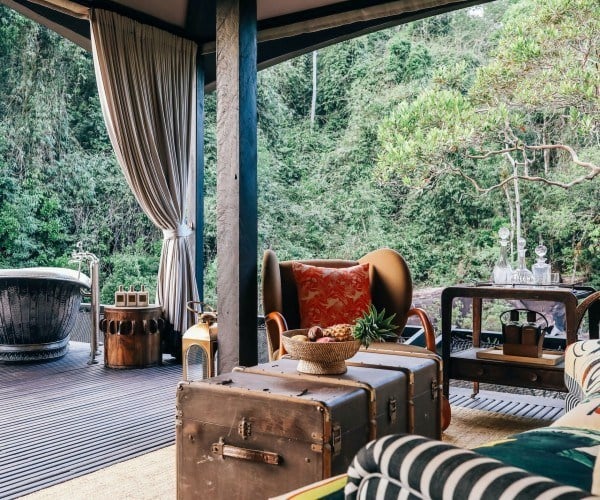 As sustainability and conservation are priorities for Shinta Mani Wild, the camp operates in partnership with international nonprofit wildlife and forest conservation organization Wildlife Alliance. Resident naturalists support the chefs in sourcing local produce to create incredible dishes. Shinta Mani Wild bottles its own water, uses recycled containers and has no single-use plastics. Impressively, 70% of the staff are from the local village.
The property exists to protect an 800-acre private nature sanctuary, as well as the neighboring forests, from poaching and logging. They have their own ranger station with a team of armed rangers that go on daily anti-poaching patrols. The goal is to not only protect this land but make it better than when they found it. This is now the biggest and last great forest in South East Asia
Shinta Mani Wild was wholly constructed by people from the area, using local materials, and without cutting down any trees. They have implemented a plastic-free supply chain, the first in Asia. Amenities are provided on request only. Thanks to solar panels, the camp is almost completely off the grid.
How to make a difference in Cambodia
You can head to Siem Reap and build a home for a low-income family; fantastic for family bonding and helping your kids appreciate how fortunate they are.
8. One & Only Mandarina, Mexico
On the Riviera Nayarit on Mexico’s wild Pacific coast, this superb property draws deeply on Mexico’s culture, with references to the Indigenous Cora and Huichol people. Traditional textiles and pottery are features of each room, and the spa, set in a natural volcanic-rock garden, is based on ancient healing practices and offers treatments including temazcal sweat-lodge rituals.
As sustainability and conservation are priorities for Shinta Mani Wild, the camp operates in partnership with international nonprofit wildlife and forest conservation organization Wildlife Alliance. Resident naturalists support the chefs in sourcing local produce to create incredible dishes. Shinta Mani Wild bottles its own water, uses recycled containers and has no single-use plastics. Impressively, 70% of the staff are from the local village.
The property exists to protect an 800-acre private nature sanctuary, as well as the neighboring forests, from poaching and logging. They have their own ranger station with a team of armed rangers that go on daily anti-poaching patrols. The goal is to not only protect this land but make it better than when they found it. This is now the biggest and last great forest in South East Asia
Shinta Mani Wild was wholly constructed by people from the area, using local materials, and without cutting down any trees. They have implemented a plastic-free supply chain, the first in Asia. Amenities are provided on request only. Thanks to solar panels, the camp is almost completely off the grid.
How to make a difference in Cambodia
You can head to Siem Reap and build a home for a low-income family; fantastic for family bonding and helping your kids appreciate how fortunate they are.
8. One & Only Mandarina, Mexico
On the Riviera Nayarit on Mexico’s wild Pacific coast, this superb property draws deeply on Mexico’s culture, with references to the Indigenous Cora and Huichol people. Traditional textiles and pottery are features of each room, and the spa, set in a natural volcanic-rock garden, is based on ancient healing practices and offers treatments including temazcal sweat-lodge rituals.
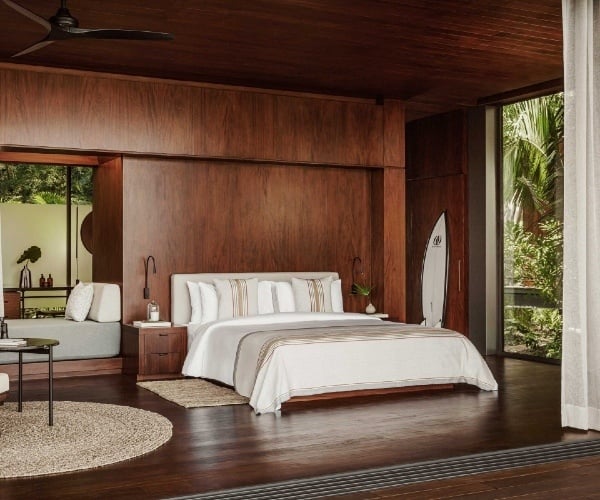 The restaurants are perhaps the most complete expression of Mandarina‘s sustainable ethos. All three menus showcase the jaw-dropping bounty of the region, with a creativity and style that never outshines the ingredients themselves. Enjoy raw clams from the famed fisheries around San Blas, homemade tostadas, abalone layered with palm hearts from the Pacific coast, local red snapper, and Oaxacan ‘chintextle’, a rust-red paste of pasilla chiles and dried shrimp.
How to make a difference in Mexico
Head to Cancun on the Caribbean coast and help sort donated food and clothing, renovate schools, or provide entertainment at an elderly home.
7. Awasi Iguazu, Argentina
Awasi Iguazu is the most luxurious place to stay when visiting the famed Iguazu Falls. Dishes are seasonal and locally-sourced to minimize food miles, and also prepared on site – yogurts, juices and granolas served at breakfast are prepared fresh each morning.
The restaurants are perhaps the most complete expression of Mandarina‘s sustainable ethos. All three menus showcase the jaw-dropping bounty of the region, with a creativity and style that never outshines the ingredients themselves. Enjoy raw clams from the famed fisheries around San Blas, homemade tostadas, abalone layered with palm hearts from the Pacific coast, local red snapper, and Oaxacan ‘chintextle’, a rust-red paste of pasilla chiles and dried shrimp.
How to make a difference in Mexico
Head to Cancun on the Caribbean coast and help sort donated food and clothing, renovate schools, or provide entertainment at an elderly home.
7. Awasi Iguazu, Argentina
Awasi Iguazu is the most luxurious place to stay when visiting the famed Iguazu Falls. Dishes are seasonal and locally-sourced to minimize food miles, and also prepared on site – yogurts, juices and granolas served at breakfast are prepared fresh each morning.
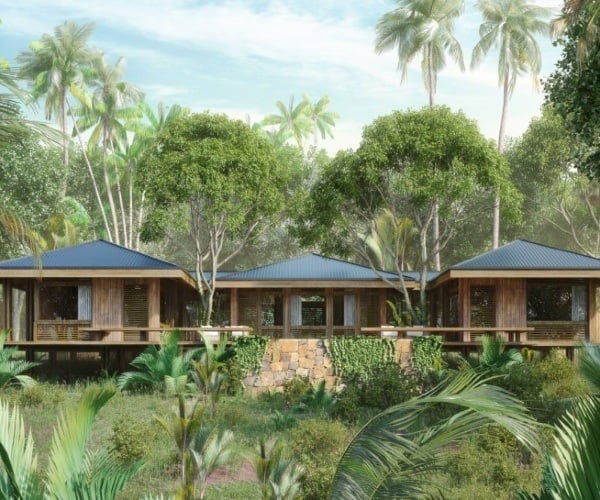 The chefs all produce their own jams, vinegars, pickles, snacks, infusions and syrups, therefore minimizing wastage and optimizing the use of excess and surplus ingredients.
Vendors and suppliers are vetted and selected based on the quantity of packaging they use. The kitchen gardens use organic waste to produce compost and fertilizer to help grow more locally sourced ingredients.
How to make a difference in Argentina
You can install solar-powered hot water heaters in low-income homes near Buenos Aires. A fun family bonding activity that benefits the recipient family as well as the environment – a double win!
6. Kasiiya Lodge, Costa Rica
Dramatically situated in Papagayo on the northwest coast of Costa Rica, Kasiiya is designed to blend into nature. Positioned amidst 123 acres of wild terrain, the tropical rainforest is preserved and only natural materials were used in order to leave the landscape untouched.
The chefs all produce their own jams, vinegars, pickles, snacks, infusions and syrups, therefore minimizing wastage and optimizing the use of excess and surplus ingredients.
Vendors and suppliers are vetted and selected based on the quantity of packaging they use. The kitchen gardens use organic waste to produce compost and fertilizer to help grow more locally sourced ingredients.
How to make a difference in Argentina
You can install solar-powered hot water heaters in low-income homes near Buenos Aires. A fun family bonding activity that benefits the recipient family as well as the environment – a double win!
6. Kasiiya Lodge, Costa Rica
Dramatically situated in Papagayo on the northwest coast of Costa Rica, Kasiiya is designed to blend into nature. Positioned amidst 123 acres of wild terrain, the tropical rainforest is preserved and only natural materials were used in order to leave the landscape untouched.
 The design has a village feel, made up of a cluster of tents, built without cutting down a single tree and without the use of concrete and nails.
Local wood was employed for the tent structure and interiors. The use of earthy tones and natural colour palettes inside the tents help you continue to feel being immersed in nature.
How to make a difference in Costa Rica
You can build a daycare center in nearby Guanacaste. Your young ones can focus on interaction and playing with the local children, while your older ones become inspired to be world changers.
5. Six Senses Fiji
On Malolo Island, just 16 miles from Nadi, this is Fiji’s finest eco-luxury accommodation.
The design has a village feel, made up of a cluster of tents, built without cutting down a single tree and without the use of concrete and nails.
Local wood was employed for the tent structure and interiors. The use of earthy tones and natural colour palettes inside the tents help you continue to feel being immersed in nature.
How to make a difference in Costa Rica
You can build a daycare center in nearby Guanacaste. Your young ones can focus on interaction and playing with the local children, while your older ones become inspired to be world changers.
5. Six Senses Fiji
On Malolo Island, just 16 miles from Nadi, this is Fiji’s finest eco-luxury accommodation.
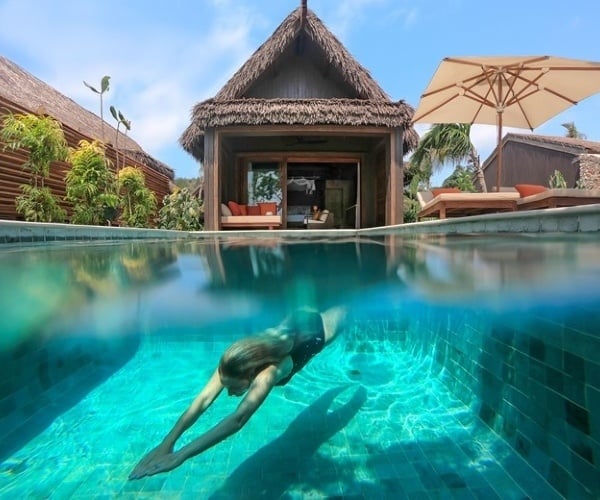 Sustainability programs include conserving energy and rainwater, making their own high-quality drinking water and growing their own organic produce to delight your tastebuds. The lodge has one of the largest off-grid solar installations in the Southern Hemisphere, producing 100% power for the resort and desalination plant. Tesla batteries are used to store the sun’s energy. Over 100 hens and roosters roam, relax and produce fresh eggs for use throughout the resort’s restaurants. A protected beehive area produces delicious honey and honeycomb.
The resort offers apprenticeships and development programs to promising young Fijians, and supports the local economy by working with a number of cottage industries.
Six Senses Fiji also partners with Rise Beyond the Reef. This NGO works with women in remote communities, teaching them to use their traditional skills to produce marketable goods. These products are used in the rooms and restaurants, and for sale in the boutique. The income from these goods goes into alleviating poverty in the local communities.
How to make a difference in Fiji
You can help renovate a home for abused children, or even build a home for family in need of a decent place to live.
4. Cielo Lodge, Costa Rica
The obvious thing you’ll notice from this 1,600-foot-high eco-lodge peaking out from the jungle are the breathtaking views.
Sustainability programs include conserving energy and rainwater, making their own high-quality drinking water and growing their own organic produce to delight your tastebuds. The lodge has one of the largest off-grid solar installations in the Southern Hemisphere, producing 100% power for the resort and desalination plant. Tesla batteries are used to store the sun’s energy. Over 100 hens and roosters roam, relax and produce fresh eggs for use throughout the resort’s restaurants. A protected beehive area produces delicious honey and honeycomb.
The resort offers apprenticeships and development programs to promising young Fijians, and supports the local economy by working with a number of cottage industries.
Six Senses Fiji also partners with Rise Beyond the Reef. This NGO works with women in remote communities, teaching them to use their traditional skills to produce marketable goods. These products are used in the rooms and restaurants, and for sale in the boutique. The income from these goods goes into alleviating poverty in the local communities.
How to make a difference in Fiji
You can help renovate a home for abused children, or even build a home for family in need of a decent place to live.
4. Cielo Lodge, Costa Rica
The obvious thing you’ll notice from this 1,600-foot-high eco-lodge peaking out from the jungle are the breathtaking views.
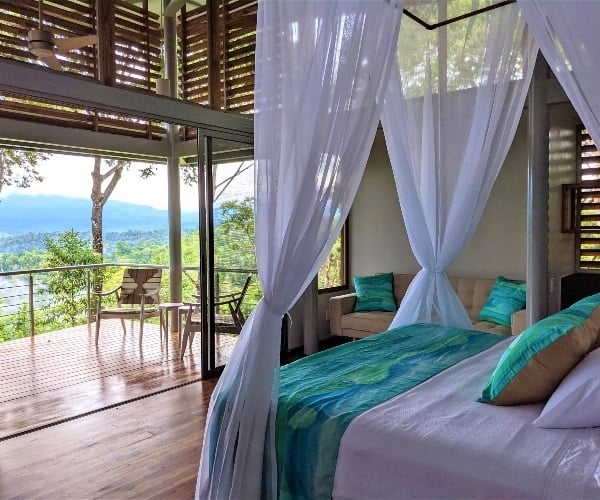 The vista stretches over Corcovado National Park, and out to the Pacific. Though the real draw may be the mission of the lodge itself: dedicated to preserving Costa Rica’s rainforests, Cielo’s owners have already planted over 4,000 hardwood and fruit trees, enticing even more birds and mammals back to the area.
Another way to make a difference in Costa Rica
Conserve turtles in the Osa Peninsula: tag turtles and study their behavior patterns. You can also help with the mangrove reforestation projects to restore the natural coastal environment: vital to the sea turtles and indeed all wildlife.
3. Wild Coast Tented Camp, Sri Lanka
Wild Coast Tented Lodge is a beguiling 36-tent safari camp located on the edge of Yala National Park, in the south of Sri Lanka. Its architecture blends into the landscape, which comprises dryland forests, and a rugged yet sandy coastline. The camp celebrates the flora, fauna and culture of the area with minimal intrusion on the landscape.
The vista stretches over Corcovado National Park, and out to the Pacific. Though the real draw may be the mission of the lodge itself: dedicated to preserving Costa Rica’s rainforests, Cielo’s owners have already planted over 4,000 hardwood and fruit trees, enticing even more birds and mammals back to the area.
Another way to make a difference in Costa Rica
Conserve turtles in the Osa Peninsula: tag turtles and study their behavior patterns. You can also help with the mangrove reforestation projects to restore the natural coastal environment: vital to the sea turtles and indeed all wildlife.
3. Wild Coast Tented Camp, Sri Lanka
Wild Coast Tented Lodge is a beguiling 36-tent safari camp located on the edge of Yala National Park, in the south of Sri Lanka. Its architecture blends into the landscape, which comprises dryland forests, and a rugged yet sandy coastline. The camp celebrates the flora, fauna and culture of the area with minimal intrusion on the landscape.
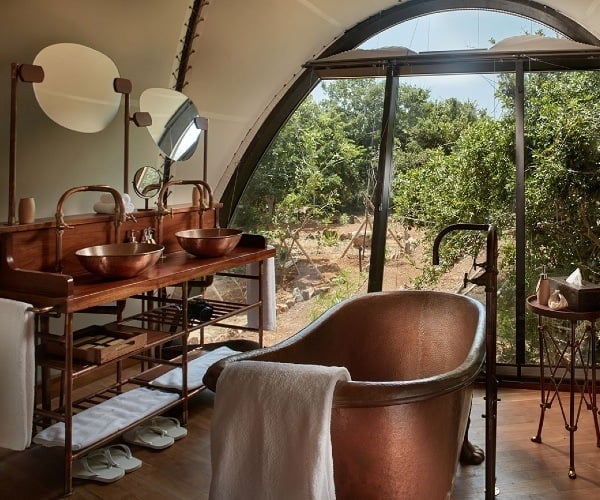 The existing vegetation is retained to ensure an authentic experience of the landscape. Local influences form an integral part of the project, from cultural traditions and materials, to community involvement.
Minimizing environmental impact demanded a locally-focused, sustainable approach to the whole development. Solar panels produce up to 40% of the camp’s energy needs. Food waste is processed to produce biogas for the kitchen, and grey water is recycled and used for watering the gardens. Even more, heat from the air-conditioning units is used for water heating.
Sourced locally as much as possible, natural materials were used in tune with the surrounding environment, celebrating the regional tradition of mud brick construction. Excavated stone and locally quarried quartz are used widely throughout, and residue clay from the gravel sieving process was mixed with elephant dung, an abundant resource, to create the restaurant and welcome area seating.
How to make a difference in Sri Lanka
Families can bond closer together by helping build a home for a family on Sri Lanka’s west coast, in a village still overcoming the effects of the Boxing Day tsunami.
2. Bisate Lodge, Rwanda
Nestled into the heart of a stunning natural amphitheater, the design of Bisate Lodge is unique. A series of nestlike rooms all include decks with incredible views.
The existing vegetation is retained to ensure an authentic experience of the landscape. Local influences form an integral part of the project, from cultural traditions and materials, to community involvement.
Minimizing environmental impact demanded a locally-focused, sustainable approach to the whole development. Solar panels produce up to 40% of the camp’s energy needs. Food waste is processed to produce biogas for the kitchen, and grey water is recycled and used for watering the gardens. Even more, heat from the air-conditioning units is used for water heating.
Sourced locally as much as possible, natural materials were used in tune with the surrounding environment, celebrating the regional tradition of mud brick construction. Excavated stone and locally quarried quartz are used widely throughout, and residue clay from the gravel sieving process was mixed with elephant dung, an abundant resource, to create the restaurant and welcome area seating.
How to make a difference in Sri Lanka
Families can bond closer together by helping build a home for a family on Sri Lanka’s west coast, in a village still overcoming the effects of the Boxing Day tsunami.
2. Bisate Lodge, Rwanda
Nestled into the heart of a stunning natural amphitheater, the design of Bisate Lodge is unique. A series of nestlike rooms all include decks with incredible views.
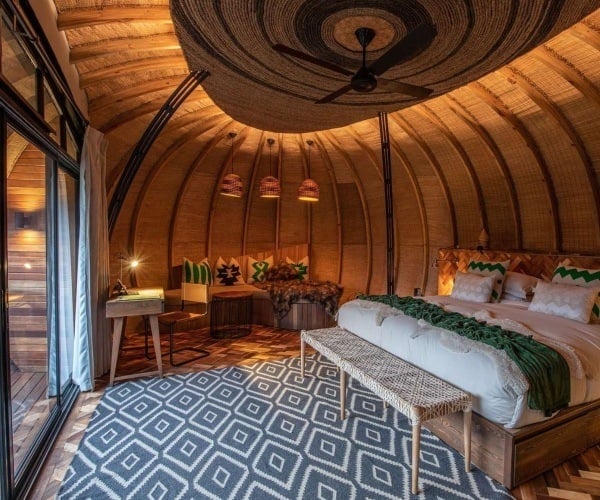 This is one of the best places to base yourself and encounter the mountain gorillas: my hour with one gorilla family is a highlight of my life. You may also spot jackal, buffalo, golden monkeys, elephants and Egyptian mongooses, among others.
The lodge’s environmental initiatives include habitat reforestation, and aims to become a Centre of Excellence for gorilla research. You are encouraged to actively engage with these initiatives during your stay.
How to make a difference in Rwanda
Build a home for genocide survivors in need of a decent place to live. A good home provides security and is healthier, so fewer sick days and school absenteeism, resulting in higher incomes and improved education outcomes.
1. Xigera Safari Lodge, Botswana
Deep in the Okavango Delta, Xigera takes sustainable luxury to another level. Spend a night in an off-the-grid treehouse with an open-air star bed, 33 feet from the ground.
This is one of the best places to base yourself and encounter the mountain gorillas: my hour with one gorilla family is a highlight of my life. You may also spot jackal, buffalo, golden monkeys, elephants and Egyptian mongooses, among others.
The lodge’s environmental initiatives include habitat reforestation, and aims to become a Centre of Excellence for gorilla research. You are encouraged to actively engage with these initiatives during your stay.
How to make a difference in Rwanda
Build a home for genocide survivors in need of a decent place to live. A good home provides security and is healthier, so fewer sick days and school absenteeism, resulting in higher incomes and improved education outcomes.
1. Xigera Safari Lodge, Botswana
Deep in the Okavango Delta, Xigera takes sustainable luxury to another level. Spend a night in an off-the-grid treehouse with an open-air star bed, 33 feet from the ground.
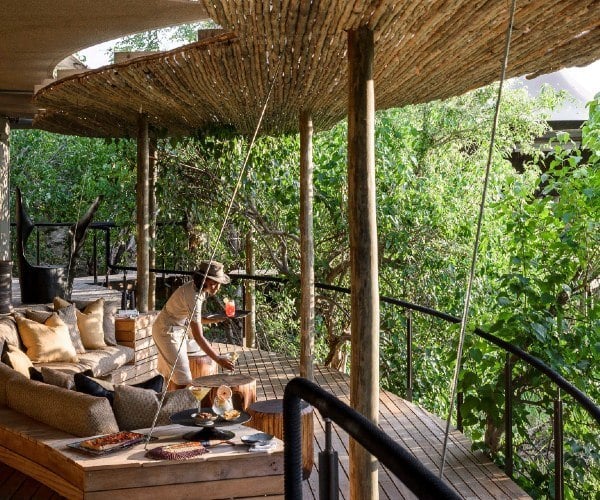 Eighty artists, artisans, crafters, and designers from across Africa were commissioned to produce a living gallery, with furniture sculpted on- site from fallen trees and tailored crockery collections by some of the continent’s most extreme ceramicists. Xigera boasts the first spa in Africa to offer organic, ‘farm-to-face’ remedies.
What’s more, it has the latest in Tesla solar-hybrid energy technology.
How to make a difference in Botswana
I suggest combining Botswana with the awesome Victoria Falls on the border of Zambia and Zimbabwe; in Zambia you can also help build a home for a widow and her children, help in the medical clinic if you are trained, or teach in the school.
Christopher Hill is Founder and CEO at Hands Up Holidays. Hands Up Holidays is an award-winning travel company specialising in tailor-made luxury family trips that combine sightseeing with hands-on service projects.
If you would like to be a guest blogger on A Luxury Travel Blog in order to raise your profile, please contact us.
Eighty artists, artisans, crafters, and designers from across Africa were commissioned to produce a living gallery, with furniture sculpted on- site from fallen trees and tailored crockery collections by some of the continent’s most extreme ceramicists. Xigera boasts the first spa in Africa to offer organic, ‘farm-to-face’ remedies.
What’s more, it has the latest in Tesla solar-hybrid energy technology.
How to make a difference in Botswana
I suggest combining Botswana with the awesome Victoria Falls on the border of Zambia and Zimbabwe; in Zambia you can also help build a home for a widow and her children, help in the medical clinic if you are trained, or teach in the school.
Christopher Hill is Founder and CEO at Hands Up Holidays. Hands Up Holidays is an award-winning travel company specialising in tailor-made luxury family trips that combine sightseeing with hands-on service projects.
If you would like to be a guest blogger on A Luxury Travel Blog in order to raise your profile, please contact us.Did you enjoy this article?
Receive similar content direct to your inbox.


Thanks for this. Nowadays, most of us look first at eco-credentials when thinking about where we are going to stay.
I often worry that some hotels indulge in some virtue-signalling, making big eco-claims for little changes that really aren’t going to save he planet. Reassuring to get an expert’s view on these hotels.
I think there are different ways of looking at it. It can be seen as exactly that – or it can simply be companies giving customers what they want. I definitely think that, post pandemic, people are becoming more thoughtfulabout how they travel – and are looking for ways to make a difference. Doing a day of volunteering here and there might not seem like much – but it might get people to think about volunteering who would not have done so before. Then they might go home with more of a volunteering mindset. I’m definitely thinking along these lines myself.
Hi Carole
Yes, you are right, there are different ways to look at things: perspective is everything.
Glad to hear that you are thinking along these lines!
There really is something otherworldly about the Kachi Lodge in Bolivia. It’s remarkable architecture and it does look really appropriate in that environment.
Hi Graham,
Yes Kachi Lodge is sublime, in an otherworldly location!
Sadly they have just announced that they will be closed until March 2022, but get booking for after then!
It is great to see that there is a hotel in Cambodia that is protecting the wildlife and giving locals jobs, it is so important to make sure that the locals have a way of making a living.
Yes indeed, Chris – Shinta Mani Wild is a superb initiative, especially as it is located in an area that previously had no accommodation.